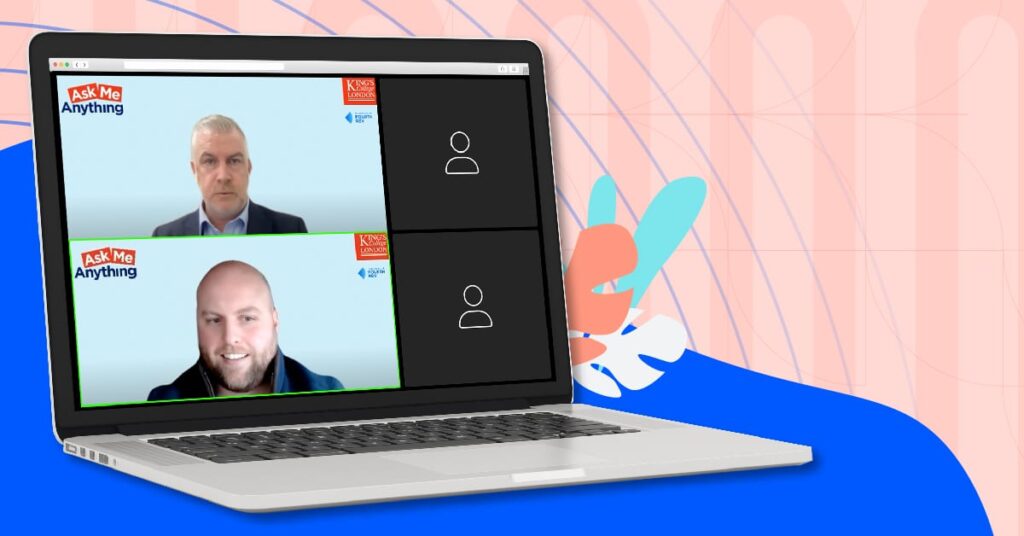
What a Career Accelerator in Product Management is Really Like – A Learner’s Perspective
- Summer White
Before making any decision, it’s often useful to get more information from someone who has firsthand experience. That’s why we invited Adam Stead, one of our learners currently enrolled in the King’s Product Management Career Accelerator, to speak to us about how he’s found the programme so far and to answer any questions from prospective learners in a recent Ask Me Anything webinar.
Adam enrolled in this programme in order to move towards a more product-focused role at his current place of work. He has more than 15 years of experience working in the rail sector and is currently working as the Product Strategy and Concepts Manager at Transport for Wales.
During the webinar, Adam and FourthRev’s Head of Enrolments, Daniel Cairns, discussed:
- How the Career Accelerator is structured
- What made it stand out to Adam compared to other online offerings
- How he balances studying with a full-time job and two young children
- The practical nature of the coursework and how he’s been able to apply what he’s learning at work
- What it’s like to work with a Career Coach
There were several questions from the audience, which Adam and Daniel addressed too, including:
- What technical experience do you need to have for this Career Accelerator?
- Can you give examples of the real-world projects you’re working on and how they can help your employability?
- What are the programme facilitators like, and what’s the experience been like learning from them?
You can watch the full recording of the Q&A session here:
Highlights from the Q&A
What stood out to you about the King’s Product Management Career Accelerator?
I was starting to look into product management as a potential career avenue. Having researched the course, the fact that it’s very industry-led with practical content was a key factor in making my decision. There are lots of certifications out there, where you can attend for five half days and go well, we’ll learn a lot. I could also just read a book. But this course looked to be more practical and actively involved people who’ve done the job before, which I liked. Being able to engage with them was a real draw.
How practical have you found the content to be, and can you see ways it can be applied in the real world?
It’s very practical. I actually recently ran a workshop at work using all of the contents of the first assignment. A lot of the work we did for that involved building a business case for a new product or feature being introduced. For the assignment, it was for a hypothetical company that offered an online streaming service – not at all related to what I do for work – but it gave me a chance to learn some new techniques and methods for exploring ideation and prioritising solutions, which are all things that I’ve read about, but never worked through before. Having gone through the assignment, I now feel I’m not a total novice. So, when I was asked to run a product strategy workshop – even though I’m not a Product Manager yet, I’ve been seen as the guy to go to to help the business explore this space – I felt confident enough to do it. The agenda for the workshop was basically the content of the first assignment.
How do you fit this programme into your life alongside a full-time job and two kids?
The way this course is structured helps a lot. It’s not just a case of reading some content, watching some videos, absorbing it all and then going away. You learn and then work through some exercises that you might share with peers, or discuss with them, which means you very much need to commit a block of time to focus.
I’ve been going through quite a stressful period at work because it’s a bit of transformation going on. It’s also been the autumn in England where everyone’s got a cold or some of the illness – I think I’m recovering from my third or fourth now – so I’ve had to be quite good at focusing in the evening. We get the kids to bed, have some dinner and then I sit down for a few hours and study. I’ve also had to preempt things like if we’re going away for the weekend, I have to get more done earlier in the week so that I can go away and not panic that I haven’t done the work.
I try and plan out my week to keep on top of the content by deciding what I’m going to do on which evenings and when I’m not going to be doing anything as well. Regular commitment is really the key.
My Success Manager has been great too because I explained my normal learning style at the start, and he helped me to plan during the induction phase so that I could start building better habits from the beginning and change my behaviours to be ready to learn. He also checked in when he hadn’t seen me do much to make sure I was okay. Once, we had a big assignment due, and I was worried about how much work there was. He helped put me at ease. I got a little email last Monday too, saying, “You’re doing great! Keep going!” and yeah, all that helps just to keep motivated and working towards those goals.
How have you found engaging with your Career Coach?
Invaluable. We’re going through a bit of a transformation at work, which caused me to question what my short-term career goals are and whether I see my future where I work right now or whether I should be looking for product opportunities elsewhere. My Coach was really useful in helping me frame what I want to achieve and what I value out of a career – and even out of my life. She coached me through my CV, creating a cover letter, applying for a job and looking at the experience through a different lens to understand what the hiring manager or target company might be looking for. It was really a really useful process. She helped me bring a whole new perspective to it. I had no product management experience on my CV, but there were elements I could draw out and tell a story about that could explain why I was right for the role. She was really, really helpful.
Is there anything you wish you had known about the programme before you started that you can share with others who are in the process of making a decision?
I hadn’t quite realised how practical it would be. From my academic background, I thought that it would be a lot more taught. It is taught, but I thought there would be more emphasis on that. It’s extremely practical. Another thing is the peer engagement. It’s a big thing. And it’s good. The peer review task, where you submit your exercise to someone else for them to comment on whilst you also received someone else’s to review, helped me reflect differently on what I’d done and really kind of grounded me a little bit. So I think the peer engagement on the course has been the most useful, almost surprising thing that I didn’t expect to find, and where I’m getting a lot of value from.
If you’d like to book a call with one of our Enrolment Advisors to start the application process or ask any questions, please download the programme brochure here and book a call today.



